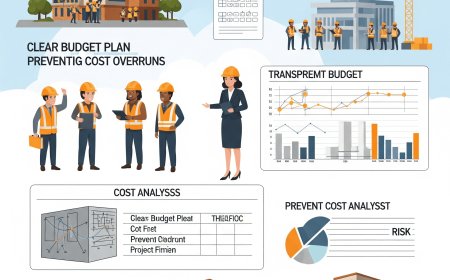What Documents Are Needed to Sell a Residential Real Estate Property
Learn about the essential documents required to sell your residential real estate property smoothly. This guide explains everything homeowners need to prepare before listing.

Selling a residential property is a major financial and legal undertaking. Whether you're selling your home or an investment property, having the right documentation in place is crucial. It ensures a smooth transaction, helps avoid legal pitfalls, and builds trust with potential buyers.
If youre preparing to sell your property, this comprehensive guide will walk you through all the key documents you'll need at every stage of the processfrom listing to closing.
1. Proof of Ownership
Before anything else, you must prove that you legally own the property you intend to sell. This typically includes:
-
Title Deed or Sale Deed: This is the legal document that shows your name as the rightful owner of the property.
-
Title Report or Title Abstract: In some cases, this additional document details the history of ownership, including any liens or encumbrances.
Make sure these documents are clear, updated, and readily available when you decide to sell.
2. Mortgage Documents (If Applicable)
If the home youre selling has an outstanding mortgage, you'll need to disclose the remaining balance and share the original loan agreement. Buyers need this information to understand if there are any existing financial obligations on the property.
-
Loan Payoff Statement: This document from your lender will show the exact amount you still owe. Its important for calculating the proceeds youll receive after the sale.
3. Property Tax Receipts
Providing the latest property tax receipts is a key step in gaining buyer confidence. These show that the property is not in default and that youve been up to date on your local taxes.
Ensure you can provide:
-
Recent annual or quarterly property tax receipts
-
A summary of past payments, if requested by the buyer or agent
4. Encumbrance Certificate
This document confirms that the property is free from any legal or financial liabilities. It assures the buyer that the property does not have pending legal disputes or unpaid debts.
In many regions, this certificate is issued by the local land or municipal authority and is valid for a specific period (usually up to 30 years of property history).
5. Occupancy Certificate (OC) or Completion Certificate (CC)
If you are selling a relatively new or recently constructed property, its important to include:
-
Completion Certificate: This confirms that the building was constructed in compliance with approved plans.
-
Occupancy Certificate: This proves the property is safe for occupation and that utilities like water and electricity are connected legally.
These certificates are often required by law for selling or transferring a property, especially in urban areas.
6. Building Plan Approvals
Buyers may request to see the original approved building plan sanctioned by the local development authority. This document shows that the structure has been built as per the legal regulations and has not violated any zoning laws.
Any deviations from the approved plan should be disclosed to avoid future legal trouble.
7. No Objection Certificates (NOCs)
Depending on where your property is located and the type of property, you might need to gather several No Objection Certificates from relevant authorities such as:
-
Water supply and sewage board
-
Electricity board
-
Society or housing association
-
Environmental clearance (for specific locations or plots)
These NOCs help buyers feel secure about the legality and functionality of the property.
8. Homeowners Association (HOA) Documents
If your property is part of a condominium, gated community, or a housing society, provide:
-
Society NOC for resale
-
Copy of the communitys by-laws or rules
-
Maintenance charge receipts
-
Dues clearance certificate
This shows the buyer that you're in good standing with the community and there are no pending obligations.
9. Utility Bills
Recent utility bills such as electricity, water, and gas are often requested by buyers. They provide a clear picture of ongoing monthly expenses and help confirm that there are no outstanding payments.
Make sure you have the latest bills from:
-
Electricity provider
-
Water and sewer authority
-
Gas supplier (if applicable)
10. Identity and Address Proof
As the seller, you will need to provide valid identification for the legal paperwork. This generally includes:
-
A government-issued photo ID (passport, drivers license, or national ID)
-
A proof of address (utility bill, Aadhaar card, or bank statement)
These documents are necessary during the agreement signing, sale deed execution, and final registration of the property.
11. Sale Agreement
Once negotiations begin with a buyer, a Sale Agreement is drafted and signed. This document includes:
-
The agreed sale price
-
Payment terms and schedule
-
Possession date
-
Responsibilities of both buyer and seller
The agreement acts as a formal commitment before the final sale deed is signed and registered.
12. Final Sale Deed
The Sale Deed is the most important legal document that officially transfers ownership from seller to buyer. It is signed by both parties and registered at the local sub-registrar office.
At this stage, ensure:
-
All prior documents are verified
-
Government stamp duty is paid
-
Registration is completed as per local laws
Once registered, the buyer becomes the new legal owner of the property.
Conclusion
Selling a residential real estate property involves much more than just finding a buyer. Having all the necessary documents organized and ready not only builds trust but also speeds up the selling process.
Whether you're working through an agent or selling independently, preparing these documents early will give you an edge. It ensures a smoother, legally compliant transaction and reduces the chances of disputes or delays.
Important Links
How En Bloc Sales Work in Singapore: A Guide for Condo Owners and Buyers
A Complete Guide to Real Estate in Singapore for Home Buyers and Investors
Understanding the Real Estate Market in Singapore
How to Start a Career in Real Estate with No Experience
Guide to Executive Condominiums (ECs) in Singapore: Are They Worth It in 2025
Thomson View En Bloc Condo Showflat











































